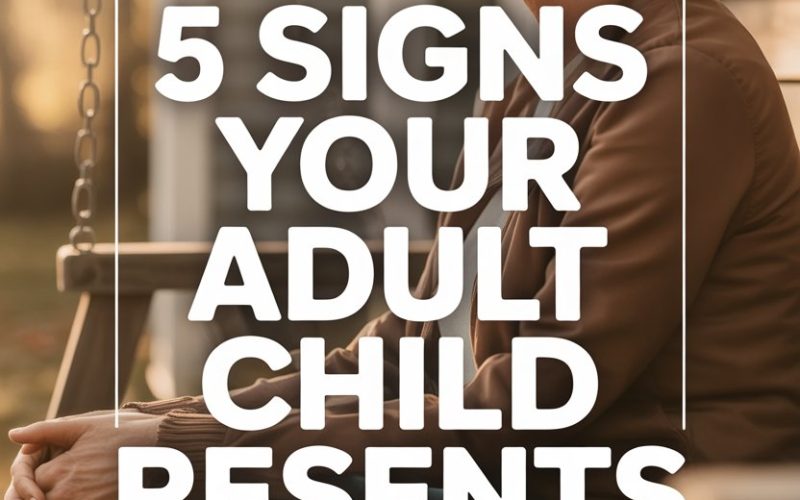Parenting adult children is a bit like being a referee in a rugby match—except the rules keep changing, nobody agrees on the score, and sometimes you get tackled by surprise.
If you’re starting to suspect your grown child is carrying a bit more than a grudge from their teenage years, you’re not alone.
Here’s how to spot whether resentment is brewing behind those texts that read “k.”
1. Communication Feels Like Walking on Eggshells
You ring them up. The conversation (if you can call it that) is less “catching up on life” and more like a hostage negotiation.
Every topic is a potential landmine: work, relationships, why they never call anymore. You tiptoe around sensitive issues, careful not to set off the next emotional booby trap.
Adult children who harbour resentment rarely let their guard down. Perhaps you notice they’re vague, monosyllabic, or always in a rush to hang up. Even their texts are as emotionally revealing as a tax return.
If direct conversation feels impossible and genuinely warm exchanges have dried up, take it as a signal.
Most parents chalk this up to “busy lives” or “that’s just how young people communicate.” Sometimes, sure. But when every chat is laced with tension, you’re probably seeing the tip of a much bigger iceberg.
What can you do tonight? Try replacing a check-in call with a simple message like, “Thinking of you—no response needed!” Pressure off, olive branch extended.
2. Your Achievements Are a Sensitive Topic
You mention a promotion, a holiday, or (heaven forbid) a new garden shed, and suddenly your adult child is more prickly than a hedgehog on laundry day.
They change the subject, offer a forced “that’s nice,” or even roll their eyes if you’re lucky enough to be video calling.
Often, resentment in adult children simmers when they feel overshadowed by a parent’s success or by unmet expectations from their own childhood.
This is especially true if they think you’ve downplayed their own struggles or achievements.
Research suggests unresolved childhood issues can colour adult relationships for decades.
As highlighted by psychologists at the University of Alberta, the way parents communicate about success and failure can leave a lasting mark on self-esteem and adult relationships.
If you sense your news triggers defensiveness, try shifting the spotlight. Ask their opinion, celebrate their wins (even if it’s just “I made it through Monday!”), and watch for moments to listen more than you talk.
Tonight, you could text, “Saw this and thought of you—know you’ve got so much on your plate.” Empathy is the best fertilizer for bruised egos.
3. Family Gatherings Are a Sore Spot
They RSVP “maybe” to every invitation. When they do show up, they arrive late, leave early, and spend most of the visit glued to their phone or “helping” in the kitchen (read: hiding from conversation).
You might catch a dramatic sigh when group photos are suggested or an eye-roll during family anecdotes.
Dragging their feet when it comes to family events often signals discomfort or resentment—especially if they used to be keen on Sunday dinners or holiday chaos.
Sometimes, unresolved hurts from childhood or perceived slights from recent years make the idea of forced togetherness unbearable.
A recent survey by Pew Research notes that one in four adults admits to feeling emotionally distant from their parents. Family events can amplify that distance, making every awkward silence or pointed joke feel like a fresh wound.
Test the waters with smaller, lower-pressure get-togethers. Invite them for a coffee or a walk—no crowd, no speeches, no guilt if they bail at the last minute.
Tonight, a quick message offering a low-key meetup (“Would love to grab a coffee this week—no pressure!”) can feel much less loaded.
4. They Avoid Discussing the Past
Bring up “that holiday in ’98” or one of your Greatest Parenting Moments, and suddenly they’re checking their watch or need to take a mystery call. Nostalgia is off the table.
Even well-meaning jokes about their childhood elicit nothing but a tight smile.
Adult children who can’t talk about the past without discomfort may be carrying old wounds. Maybe your version of events doesn’t match theirs, or experiences you thought were “character-building” still sting.
Unprocessed emotions have a sneaky way of sabotaging the present.
Experts like Dr. Joshua Coleman note that estrangement and resentment often trace back to unresolved family narratives. If your adult child resists reminiscing, it could mean they’re struggling to reconcile the past with their present feelings.
No need to launch a confessional tonight. Instead, try opening a small door: “If there’s anything you’d like to talk about—good or bad—I’m here to listen, promise I’ll stay in ‘mum mode’ not ‘fix-it mode.’”
Give them the chance to set the pace.
5. You Only Hear From Them When They Need Something
Your ringtone brings news, but the pattern is hard to ignore. “Mum, can you help with my tax?” “Dad, do you know a good plumber?” “Could you look after the dog this weekend?”
You’d love to believe it’s because they trust your wisdom, but it feels transactional. When did you become the family helpline?
Resentment can morph the parent-child relationship into a series of business transactions. Instead of mutual affection, there’s an undercurrent of obligation or, worse, entitlement.
Some parents find themselves the go-to for resources—money, advice, emotional support—but get radio silence otherwise.
If you notice a one-sided pattern, it’s time to set gentle boundaries. A study by the University of Michigan found that 59% of young adults still rely on parents for support, but healthy relationships require more than just logistical backup.
Try this: next time they ask for help, respond warmly, but add, “Would love to catch up properly soon—just a chat, no agenda.”
If you sense they’re bracing for a lecture, reassure them: “No strings attached, just miss hearing your voice!” See if you can coax out a non-transactional connection.
Rebuilding the Bridge Without Building Resentment
Spotting resentment in your adult child is a bit like finding out no one ever liked your signature casserole—you wish it wasn’t true, but ignoring it won’t make it go away.
The good news: even if emotional distance has crept in, relationships can shift. Tonight, aim for empathy over explanation.
Trust that small gestures (a thoughtful message, a low-pressure invite, an honest apology when it’s called for) can start to thaw the frostiest dynamic.
Remember, you’re not alone. Thousands of parents are muddling through the same wobbly bridge.
The trick is to approach these moments with equal parts humility, courage, and a willingness to laugh at yourself.
Sometimes, the best step forward is to simply say, “I see you, I love you, and yes, I’ll pay for the plumber—but only if we can have lunch after.”




